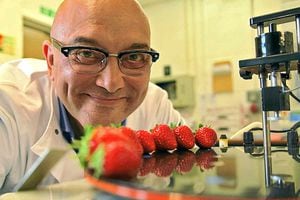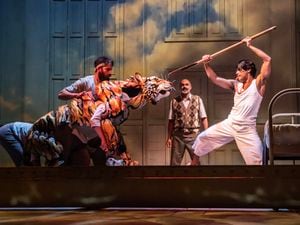TV review: Supermarket Secrets
Ever wondered how supermarkets manage to keep up with seasonal demand? No, me neither, but that didn't stop the BBC from seeing fit to tell us anyway.

The first in a new four-part series sought to explain exactly how Sainsbury's, Waitrose and co handle increased orders for the summer season. If that sounds interesting to you then I fear you either helped make this show, or you need prescription glasses.
"Supermarkets have a huge influence over our lives, but exactly how they bring us our food has been hidden," intoned Gregg Wallace from Masterchef.
Well, has it? If people don't know exactly how the food gets to the store it's not because it's a secret, it's because they flat-out don't care. Besides which, it hardly takes a logistics genius to fill in the gaps between spud in the ground, and spud in the shop (hint: it involves migrant labour and a lorry).
Of all the things they could have covered about supermarkets – their domination of the high-street, their dodgy land deals to their treatment of farmers – someone instead thought it was in our interest to show us a colour chart for banana ripeness because gosh, I didn't know that canary yellow was a riper colour of banana than rubber-ducky yellow. Although the thoroughly nice presenter is as liable to get the inside scoop on supermarkets as Wally is of maintaining anonymity in a crowd.
And really, we shouldn't be surprised that this show managed to sputter into life given the recent trend of PR schemes masquerading as television programmes. It's just that in many ways Supermarket Secrets is even more egregious than Sky 1's Greggs: More Than Meats the Pie. At least that show doesn't gussy itself up like a consumer advice documentary.
In fact, much of the show felt directly lifted from a corporate pamphlet. So many statistics and numbers were thrown around it felt like I'd woken up back in a GCSE statistics exam: we eat 55 million steaks in the summer, hair removal products go up 1400%, a 10 degree rise in temperature sees a 300% rise in the sale of sausages and burgers. I wasn't sure if any of that was relevant of whether I was supposed to start plotting it onto a boxplot.
And when you were begging for the onslaught of pointless figures to cease, a soulless-smiling corporate suit from Tesco with bar graphs for pupils waxed lyrical about how accurately their computer system can predict shopping habits. All wonderful soundbites indeed but it begs the question that if they can estimate what we're going to buy with any degree of accuracy then why do we still see supermarkets produce mountains of food waste?
And where Wallace is amazed by the storage and processing of meat and the utilitarian glory of the mechanics of the process, I found the sheer uniformity of colour, size, shape and temperature of all the products somewhat sad. It's as though the desired effect is the food equivalent of an army of toy soldiers where any deviation from the norm is to be avoided at all costs.
Try as I might, I couldn't find a single redeeming feature to this show (and trust me, ever the optimist I watched it twice over to find something). There wasn't a single word spoken, camera angle filmed or smile cracked that wasn't dictated by a committee of supermarket chairmen behind the camera.
We'll get the next instalment when autumn rolls around, unless of course the show withers on the vine.
Robert Taylor




